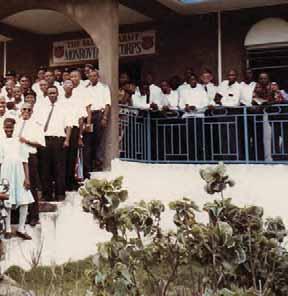
5 minute read
Attempting the impossible
Major Rosemary Dawson recalls the international service of Lieut-Colonels Brian and Dorothy Knightley, members of the Order of the Founder, who were both promoted to Glory in late 2019
ADMITTANCE to the Order of the Founder – The Salvation Army’s highest honour – is relatively rare. Instituted on 20 August 1917 by General Bramwell Booth, it is specifically given to mark ‘outstanding service rendered by officers and soldiers such as would in spirit and achievement have been specially commended by the Founder’.
Lieut-Colonels Brian and Dorothy Knightley were admitted to the Order of the Founder by General John Larsson during territorial family celebration meetings at London’s Royal Festival Hall in November 2004. They are the only UK married couple to be given this honour.
The citation described their 13 years of sacrificial and dedicated service in Liberia, West Africa, as ‘above and beyond the call of duty’. The couple had returned to the UK earlier that week for imminent retirement, after farewell meetings in Liberia were cancelled because of an upsurge in the civil war. The Army had been established in Liberia in 1988 by pioneer officers from Canada, Majors Len and Dorothy Millar. When the outbreak of civil war forced them to leave in May 1990 there were 10 corps, 700 soldiers and a number of schools.

A new Army building in Liberia
Seventeen months later, during which time the civil war had disrupted the Army’s work, Brian and Dorothy arrived, with two suitcases, two Bibles, a cornet and precious little else. At the end of their 13-year leadership there were 18 corps, 16 outposts, two large clinics, two hostels, an officer training college, 30 national officers, 2,000 soldiers and more than 4,000 children receiving education in 11 Army schools. This was achieved through dogged determination, sheer hard work and dedication.

Monrovia Corps
Living in constant danger often meant leaving at short notice – once involving a rescue by Ghanaian soldiers and evacuation by an American helicopter. Easter 1996 was a particularly tense time, as told in Brian’s book, Mission Liberia. They hid in a cupboard under the stairs for safety when war broke out again. It was a tight squeeze, particularly when their dogs pushed in and competed to be closest to Dorothy.
The Knightleys were commissioned as officers in the 1974 Overcomers Session and served in corps ministry at Bridgend, Newport Central and Mexborough.

Aids education seminar in Liberia

It was 1981 before Brian was able to fulfil his calling to international service – using his experience as a teacher, he became superintendent of Bradley Institute, a mixed secondary school in Zimbabwe. Besides academic success, a number of Bradley’s students became Christians and uniformed Salvationists. Brian also set about forming a band, purchasing some old instruments from Salisbury Citadel and receiving others from visiting overseas Salvationists. The band went from strength to strength – learning to march, playing for Sunday worship and youth councils and conducting spiritual campaigns at other corps.
This ended when Brian and Dorothy returned to England for the sake of their daughter’s further education, tempered by the belief that their work in Africa was unfinished – later realised in leading the work of The Salvation Army in Liberia.
The Knightleys retired to Dunstable, enjoying being able to see more of their two sons, their daughter and the extended family: 10 grandchildren, 16 great-grandchildren and a great-greatgrandchild.
However, ‘retirement’ was not a word that Dorothy and Brian understood. They subsequently undertook seven periods of leadership at unofficered corps, including Gloucester, Norwich Citadel and Wick. In response to many requests, Brian also wrote his second book, 'Zimbabwe Calling'.
After their final appointment at Wick the couple soldiered at Eaton Bray. Dorothy was active in ladies groups and Brian taught a succession of learners to play instruments. They performed at a carol service he organised shortly before his promotion to Glory last year.
Jackson Towah, a young convert and fellow worker, spoke movingly at Brian’s funeral of the couple’s influence on his life. He said: ‘When Liberia descended into civil war in the 1990s, hope was lost for young people. But the Lord sent us two British missionaries with the gospel.
‘The Knightleys came and took away the guns from the hands of conscripted child soldiers and replaced those weapons with the Bible and education. During our war and transition period they turned our most feared murderers into lawyers, medical doctors, judges, journalists, theologians, bankers and accountants.
‘In March 1991 I returned from exile in the neighbouring Ivory Coast. Later that month I met the Knightleys outside the former British Embassy near Monrovia, inviting folks to come and pray with them in their living room. The Salvation Army was pretty new to Liberian people, but I accepted the invitation and before too long I also accepted Christ. ‘By 1993 it was a fast-growing Christian institution in the country. The Army’s educational system stood at the epicentre of prestigious and bestranking schools in Liberia.
‘We all have our heroes, people who do extraordinary things. Brian Knightley was mine. He will be remembered as a good and decent man, who saw wrong and tried to correct it, saw injustices and dispensed justices, saw suffering and tried to heal it, saw war and tried to stop it. He taught us to have strength in time of trouble, wisdom in time of uncertainty, and sharing in time of happiness.
‘When rebel forces pinned us down at gunpoint on 6 April 1996 he even prayed for those who threatened to kill us in our kitchen. To my surprise, “Missy” [Dorothy] dared to stand between the gun and the dogs. She told them to take whatever they wanted, but no one should harm her dogs!
‘He and Missy taught me and other teenagers to grasp Christian values. They were father and mother figures to everyone they met.’ In his foreword to Mission Liberia, Brian wrote: ‘I hope [this book] will inspire you to attempt the impossible for God. In the midst of a civil war, I believe God enabled us to do exactly that.’ And God certainly did.
MAJOR DAWSON LIVES IN RETIREMENT IN NORWICH







